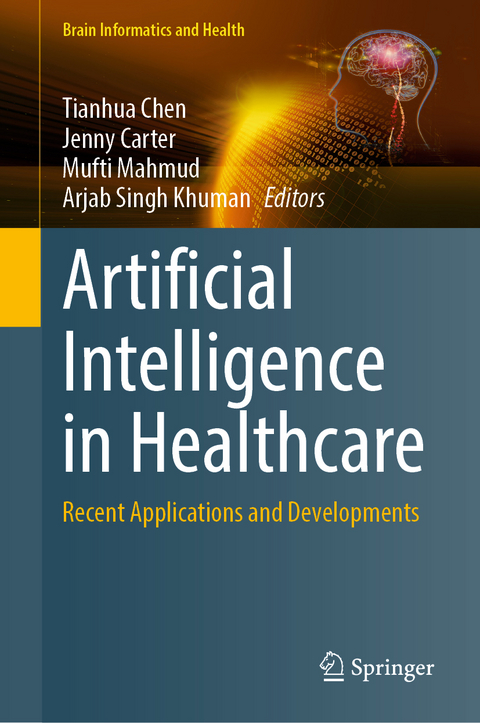
Artificial Intelligence in Healthcare
Springer Verlag, Singapore
978-981-19-5271-5 (ISBN)
Dr. Tianhua Chen received the Ph.D. degree in Computer Science in 2017 from Aberystwyth University, Aberystwyth, UK. He is currently Senior Lecturer in Artificial Intelligence with the Department of Computer Science, School of Computing and Engineering, University of Huddersfield, Huddersfield, UK. With research supported by Research England, NHS among various stakeholders, Dr. Chen has published over 50 peer-reviewed papers in leading international journals and conferences. While sitting in the Editorial Board of Artificial Intelligence in Medicine journal, he is very keen translating AI techniques in the healthcare sector, particularly mental health. He has also previously edited a book volume and numerous special issues in journals such as Artificial Intelligence in Medicine and Frontiers in Neuroscience. Dr. Jenny Carter gained a Ph.D. in Artificial Intelligence Techniques and Musical Style Analysis in 2004. She is now semi-retired and works ona part-time basis at Huddersfield University. She is former Subject Area Leader in Computing & Information Systems at Huddersfield University. Prior to October 2017, she was Associate Head of School of Computer Science & Informatics at De Montfort University and Subject Group Leader for Computer Science & Security. She was also Faculty Academic Development Partner. Her teaching expertise includes fuzzy logic, data mining, knowledge-based systems, and databases. Her specialist areas for research are e-learning in higher education and applications of AI, in particular to music-related problems. She has a number of journal and conference publications as well as 3 previous edited books. Dr Mufti Mahmud is an Associate Professor of Cognitive Computing at the Computer Science Department of Nottingham Trent University (NTU), UK. He has been the recipient of the top 2% cited scientists worldwide in computer science (2020), the NTU VC outstanding research award2021, and the Marie-Curie postdoctoral fellowship. Dr Mahmud is the coordinator of the Computer Science and Informatics research excellence framework unit of assessment at NTU and the deputy group leader of the Cognitive Computing & Brain Informatics and the Interactive Systems research groups. His research portfolio consists of GBP3.3 million grant capture with expertise that includes brain informatics, computational intelligence, applied data analysis, and big data technologies focusing on healthcare applications. He has over 15 years of academic experience and over 200 peer-reviewed publications. Dr Mahmud is the General Chair of the Brain Informatics conference 2020, 2021, and 2022; Applied Intelligence and Informatics conference 2021 and 2022; Trends in Electronics and Health Informatics 2022; chair of the IEEE CICARE symposium since 2017 and was the local organising chair of the IEEE WCCI 2020. He will serve as one of the General Chairs of the 31st edition of the ICONIP conference to be held in Auckland (NZ) in 2024. He is the Section Editor of the Cognitive Computation, the Regional Editor (Europe) of the Brain informatics journal and an Associate Editor of the Frontiers in Neuroscience. During the year 2021-2022, Dr Mahmud has been serving as the Vice-Chair of the Intelligent System Application and Brain Informatics Technical Committees of the IEEE Computational Intelligence Society (CIS), a member of the IEEE CIS Task Force on Intelligence Systems for Health, an advisor of the IEEE R8 Humanitarian Activities Subcommittee, the Publications Chair of the IEEE UK and Ireland Industry Applications Chapter, and the Project Liaison Officer of the IEEE UK and Ireland SIGHT Committee, the Secretary of the IEEE UK and Ireland CIS Chapter, and the Social Media and Communication Officer of the British Computer Society's Nottingham and Derby Chapter. Dr. Arjab Singh Khuman received his PH.D. degree in Computer Science from De Montfort University (DMU), United Kingdom, in 2017. An award winning academic, he is currently a Senior Lecturer at DMU within the Institute of Artificial Intelligence (IAI), where he leads on various initiatives involving pedological enhancements and research directives. Dr. Khuman’s research interests involve artificial Intelligence with a focus on uncertainty modelling and machine learning, utilizing soft computing techniques and paradigms to allow for higher-dimensional inferencing, to facilitate more precise forecasting & predicting. With a publication record that exemplifies excellence, a proven track record of top-tier journals & conference proceedings; books & chapters; international engagement; Dr. Khuman’s work continues to be internationally recognised and of high merit.
Chapter 1. Deep fuzzy neural network in dementia.- Chapter 2. Machine learning for COVID detection.- Chapter 3. Machine Learning techniques applied to identify significant gene biomarkers for efficient cancer treatment.- Chapter 4. Group decision making in intelligent medicine.- Chapter 5. Fuzzy logic system for diabetic eye detection.- Chapter 6. Sentiment analysis using deep neural networks.- Chapter 7. The emerging role of AI in dementia research and healthcare.- Chapter 8. Identifying high impact underlying conditions in disease management using AI.- Chapter 9. AI in medicine- case in Asthma diagnosis.- Chapter 10. Sentiment Analysis of Stroke Tweet.- Chapter 11. Artificial intelligence in detecting Alzheimer’s Disease.- Chapter 12. Intelligent systems for IoT based healthcare delivery.- Chapter 13. Machine learning for the detection of Schizophrenia.- Chapter 14. Ictal discharge detection from neuronal signals using machine learning.- Chapter 15. Sentiment analysis for healthcareservice provisioning.- Chapter 16. AI Healthcare: Malignant or Benign.- Chapter 17. Machine learning for dementia diagnosis.- Chapter 18. Using fuzzy systems to calculate blood pressure levels.
| Erscheinungsdatum | 17.11.2022 |
|---|---|
| Reihe/Serie | Brain Informatics and Health |
| Zusatzinfo | 106 Illustrations, color; 21 Illustrations, black and white; VIII, 227 p. 127 illus., 106 illus. in color. |
| Verlagsort | Singapore |
| Sprache | englisch |
| Maße | 155 x 235 mm |
| Themenwelt | Mathematik / Informatik ► Informatik ► Datenbanken |
| Informatik ► Theorie / Studium ► Algorithmen | |
| Informatik ► Theorie / Studium ► Künstliche Intelligenz / Robotik | |
| Medizin / Pharmazie | |
| Technik ► Medizintechnik | |
| ISBN-10 | 981-19-5271-X / 981195271X |
| ISBN-13 | 978-981-19-5271-5 / 9789811952715 |
| Zustand | Neuware |
| Informationen gemäß Produktsicherheitsverordnung (GPSR) | |
| Haben Sie eine Frage zum Produkt? |
aus dem Bereich


